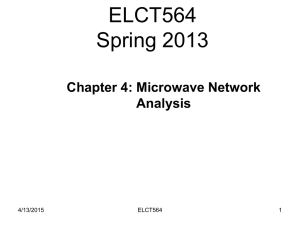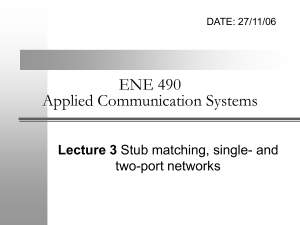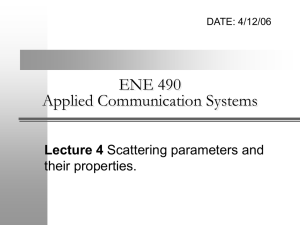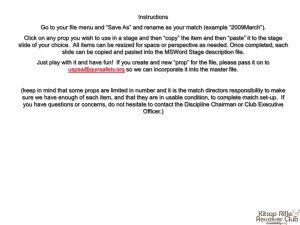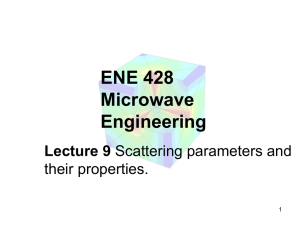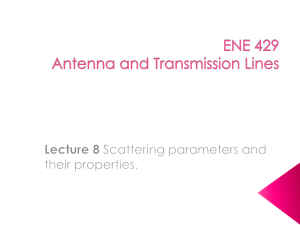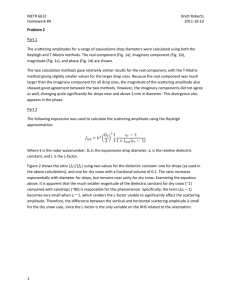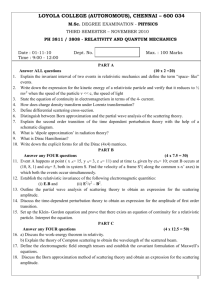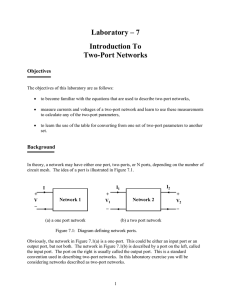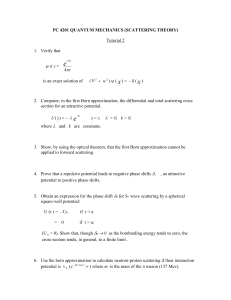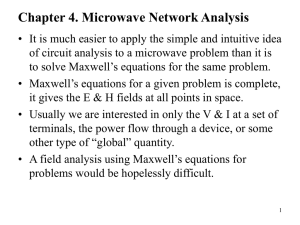High Speed Electronics
advertisement
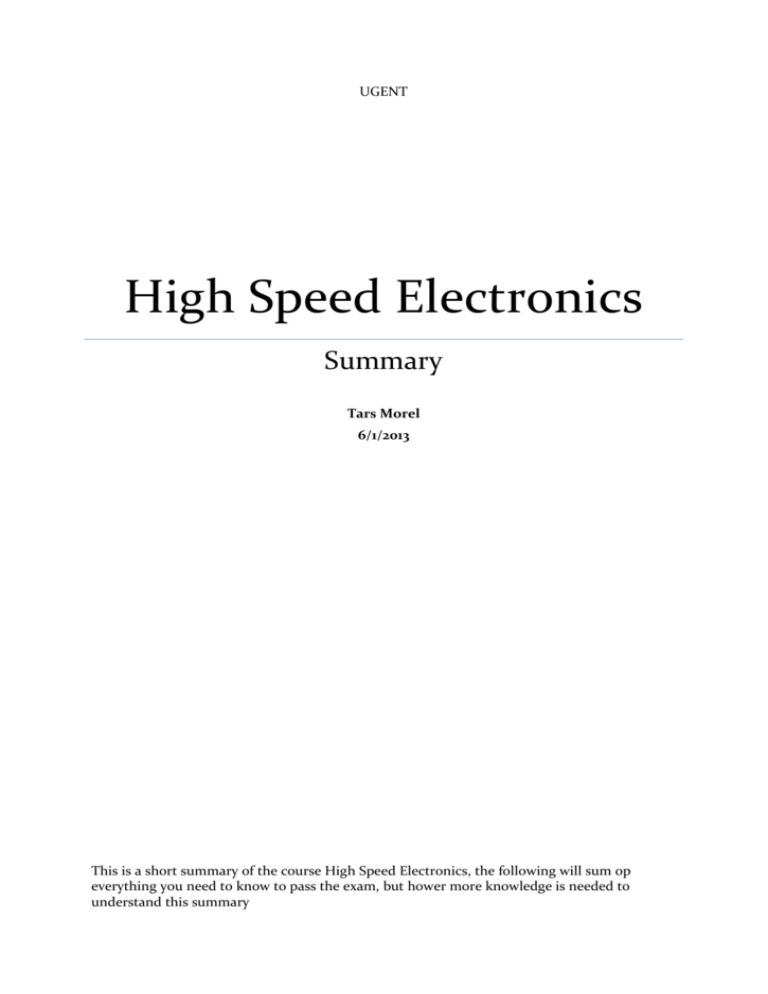
UGENT High Speed Electronics Summary Tars Morel 6/1/2013 This is a short summary of the course High Speed Electronics, the following will sum op everything you need to know to pass the exam, but hower more knowledge is needed to understand this summary CHAPTER 0: GENERAL Power 𝑃 = ½ 𝑅𝑒[𝑉 ∗ 𝐼 ∗ ] Transformer 𝑉𝑙 𝐼𝑟 𝑛𝑙 = = 𝑉𝑟 𝐼𝑙 𝑛𝑟 Sinus rules 𝑠𝑖𝑛(𝑎)𝑐𝑜𝑠(𝑏) = ½(𝑠𝑖𝑛(𝑎 + 𝑏) + 𝑠𝑖𝑛(𝑎 − 𝑏)) 1 1 ∫ sin(𝑥)2 dx = x − sin(2x) 2 4 BJT: nonzero collector current 𝑖𝐶 = 𝐼𝐶 𝑒 𝑉𝐵𝐸 /𝑉𝑇 𝑞𝐼𝐶 𝑔𝑀 = 𝑘𝑇 Conjugate matching Zload = Zsource* Thevénin & Norton gm,eff Of CS stage OC tau At a capacitor the effective resistance facing it equals rLEFT +rRIGHT + gM,EFFrLEFTrRIGHT CHAPTER 1: CLARIFYING CONCEPTS AND DEFINITIONS WEAK NONLINEARITY IN THE FREQUENCY DOMAIN N-th order harmonic distortion Ratio of the amplitude of the n-th order harmonic to the amplitude of the fundamental term 1-db compression point Signal level for which the small signal gain is 1 dB lower than the law predicts Desensitization Presence of a strong signal decreases the gain, so a weak signal is amplified less Cross modulation Cross modulation index Strong signal with variable amplitude modulates a weak signal Intermodulation (IM) Two (or more) signals with little difference in frequencies (w1 & w2) can modulation e.g. 2w1 – w2 or 2w2 – w1 will fall within the pass band. 3rd order interception point 3rd order input/output intercept level (IIP3 / OIP3) Point where the first and third order harmonics have equal amplitude DEFINITIONS AND SPECIFICATIONS IN THE TIME DOMAIN (ONLY DEFINITIONS) Time invariant system time shift of the input results in the same shift at the output Memory less Dynamic Output is independent of the history of the input Linear time invariant The output does not contain other spectral components than are present in the input signal Can distort the signal due to spectral limitations and possible dispersion Inter symbol interference (ISI) Due to spectral limitations (to steep square wave will have many harmonics => make pulse equal to sinc) and group delay (multimode) We can use Nyquist channeling => previous’ bit responses are zero Elmore delay Time that expires until the impulse response h(t) has reached its mass midpoint Bandwidth and rise time w3dB = t_rise*2.2 SENSITIVITY AND DYNAMIC RANGE Sensitivity The weakest power that van be processed with a given quality Minimal detectable signal (MDS) Noise factor Ratio of input to output SNR, added noise by the system Dynamic range (DR) Ratio of the highest input power that can be handled with given quality (non linearity) and the lowest input power that can be handled with a given quality (noise floor) Spurious free dynamic range (SFDR) Narrower than DR Same as DR but: Minimum signal level = minimum detectable input power needed to support a given service with a predefined quality. Maximum signal level = maximum amplitude of a two-tone signal within the pass band, whose IM3 products are smaller than or equal to the noise floor. Only suitable for BW < 1 octave (else use IM2) Can also be derived from following graph Or CHAPTER 2: LINEAR CIRCUIT ANALYSIS MATRIX REPRESENTATION: AN OVERVIEW Linear two port network V1, I1, V2 and I2 describe the network. Source and load. Unilateral network I/O ports are perfectly isolated, transmission in only one direction Stable DC-operating point VCE and IC Provide DC paths via resistors where needed Apply feedback to stabilize the operating point Use a decoupling C (around a central frequency) at power supply B = input, C = output, E can be both ZIN ZOUT V gain I gain CE Medium Medium -Av -Ai CC High Low < +1 Ai CB Low High Av < +1 SCATTERING PARAMETERS Why scattering parameters Z,Y,… matrices need to be terminated with incremental short or open circuit, not possible at HF: parasitic capacitance and inductance Each port will be terminated with a fixed and finite, high accurate impedance Reflection coefficient or scattering parameter (Gamma) I = Ii - Ir V = VI + VR I = incident: ZL = R0 R = reflected Matched load impedance No power reflection Max signal source power Source and load dissipate the same amount of power Smith chart: Impedance chart Zln is the normalized: ZL/R0 Loci of constant resistance Loci of cte load reactance TL: rotate around centre point Smith chart: Admittance chart Mirrored over centre point Two port S-parameters a = incident port power level b = reflected port power level All ports are terminated on R0 for measurement Unilateral: S12 = 0 Reciprocal: S12 = S21 P gain High Medium Medium Passive (= positive energy delivered): [S]T [S]* = [E], a unitary matrix Lossless: S is unitary Scattering analysis of a loaded/sourced two port GammaS = bS/aS GammaL = bL/aL Gamma2 = 1/GammaL Signal flow graphs Nodes: for every scattering variable Branches: directed path between an a-node and a b-bode Node value = sum of products (arriving branch * sourcing mode) Signal flow graphs of a two port Series, parallel, self-loop and splitting rule!! Mason’s gain rule POWER GAIN AND STABILITY Power delivered by the two-port network to ZL Power available from the source Delivered when load is impedance matched to the source Transducer power gain GT Power delivered by two-port to load/power available from source PL/PAVS Operating power gain GP Power delivered by two-port to load/power delivered by source to two-port PL/PIN Available power gain GA Power available at the output of the two-port / power available from source PAVN/PAVS Unconditional stability We consider passive terminations: |L/S | < 1 No oscillation is possible when |IN/OUT| < 1 When stability circles do not cross the Smith chart border Conditional stability or potential instability Oscillation is possible but not certain when, |IN or OUT| > 1 Range of terminations s and L for which a two port is stable at a given frequency Stability circle on the smith chart, locus in L/S plane for which IN/OUT = 1 Output stability circle (& vice versa) Defined in the output plane, describes the stability of the INPUT network, when gammaIN equals one
